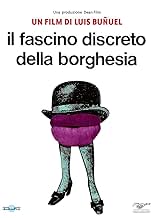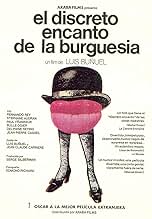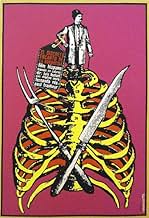Le charme discret de la bourgeoisie
- 1972
- Tous publics
- 1h 42m
IMDb RATING
7.7/10
50K
YOUR RATING
A surreal, virtually plotless series of dreams centered around six middle-class people and their consistently interrupted attempts to have a meal together.A surreal, virtually plotless series of dreams centered around six middle-class people and their consistently interrupted attempts to have a meal together.A surreal, virtually plotless series of dreams centered around six middle-class people and their consistently interrupted attempts to have a meal together.
- Director
- Writers
- Stars
- Won 1 Oscar
- 7 wins & 9 nominations total
Stéphane Audran
- Alice Sénéchal
- (as Stephane Audran)
- Director
- Writers
- All cast & crew
- Production, box office & more at IMDbPro
Featured reviews
I am surprised that nobody recognized what the author wanted to say with this movie. The whole movie (except the last few minutes) is a dream of one ordinary man. He probably went to sleep without having dinner, and in his dream he pass through various situations where he and his friends intend to eat. But, they were interrupted every time, and he did not manage to have his meal at all. The reasons are every time stranger and stranger. Finally he woke up, goes to the kitchen and took from his refrigerator everything he find's. In one sentence, this movie is about our lust for eating. Simple, but extraordinary.
"The Discreet Charm of the Bourgeoisie", a leisurely paced, incisive satire on social mores and class hypocrisy, opens with a group of friends arriving on the wrong day of a dinner engagement. this is only the begining of a succession of unexpected and unusual events to follow. The dinner party is the movie's main setting and it is there that reality and illusion often times blend imperceptibly together. The film is structured as a series of surreal sequences, which prompted esteemed film critic Pauline Kael to opine 'His(Director Louis Bunuel) indifference to dramatic logic is complete.' And how. Bunuel's narrative plays an elaborate game with the viewer through it's subconscious imagery and audacious use of time. His tendency to experiment with technique and form often times led to discovery and innovation. The cinema of Louis Bunuel invariably deals with the discrepancy between appearance and reality; decorum and desire. His world view was subversive and anarchistic. He was a cheerful pessimist, skeptical but not susceptible to Bergmanian despair. His skepticism extended to all of those he found playing too neat a social game. The filmmaker's career was one sustained assault on authoritarianism. Witness an indiscreet character in the film who claims: 'No one system can help the masses acquire refinement.' He believed man was, unconsciously, a slave to custom and aimed to shock viewers out of their unthinking acceptance of established values. "The Discreet Charm of the Bourgeoisie"(An Academy Award winner in 1972 for Best Foreign Film) is a boldly inventive picture. Dozens of frames are filled with clever filmic devices: environmental noises increase inordinately during routine conversations; an ambiguous procession is inserted freely within the text. These cinematic ploys add intrigue to the already peculiar goings-on. The walk by the main group of characters along a country roadside is mysterious and compelling. The players are noticeably silent and contemplative. Is this an anxious dream? The afterlife? An insignificant flashback? Whichever, the recurring sequence underscores the obliqueness and cool obscurity of the film. One might not identify closely with the disenchanted Bunuelian sensibility or the unsentimental stance he takes, however one knows immediately and unmistakably that they are in the gifted hands of a film technician like a Godard or Kurosawa. A director in complete control of his medium. A highly personal filmmaker frequently referred as 'a poet of hallucination who follows the caprices of his fantastical imagination.' Someone whose fanciful paths of creation were invariably led by the irrational. "The Discreet Charm of the Bourgeoisie", with it's arresting mixture of calculation and carelessness, remains a unique and influential movie. The acerbic films of Robert Altman and the perverse mischievousness of the Coen brothers films, to mention but a few, pay a large debt to the strange universe and unconventional perspective of Louis Bunuel. Film lovers uninitiated in surrealist cinema will find "The Discreet Charm of the Bourgeoisie" an alluring and beguiling crash course.
Bunuel is arguably the greatest of all filmmakers. With the possible exceptions of Hitchcock and Fassbinder, I can think of no other director who so completely understood the potential of the medium to transcend the traditional conventions of narrative, or exploited this potential with such élan. And he doesn't rely on special effects: we enter the surreal realm so seamlessly that it at times seems banal. This is especially the case in 'Le charme': banal people have banal sub-consciousnesses.
In order to begin to appreciate Bunuel I had to immerse myself in his milieu, so foreign was his sensibility to the usual expectations I had brought with me into a movie theater.
It took me several viewings to get the 'jokes' if 'Le charme'. The Ambassador from some obscure Latin American country ('Miranda', or 'wonder', a nod to Shakespeare), supports this little microcosm of comfortable Parisian bourgeois respectability with cocaine smuggled in diplomatic pouches. Guests arrive for a dinner party on the wrong evening, and interrupt the hosts having sex. A wake is being held in the back room of the restaurant they are planning to dine at. Ice cubes for martinis must be 'exactly zero degrees'. Elegant ladies sit down for a fashionable afternoon tea, only to be told by their waiter that the restaurant has run out of water (?!!). A soldier then comes to their table and relates his parricidal dream, while the polite ladies listen to him unfazed. One of the ladies discreetly slips away for an assignation with another one's husband. Only Bunuel!
Doubtless the inspiration for this film comes from the Latin Bunuel's lifetime of experience observing the French in situ. Much of its fun comes from simply watching the French be so . . . French. And there is no bourgeois like a French bourgeois!
Much of 'Le Charme' takes place in the nightmares of its characters: you are sitting down for a dinner being hosted by a general, only to realize that you are on stage (with a prompter giving a cue from Don Juan: 'Invite the commander's ghost for dinner!'); your elegant dinner party is broken up by a gang of thugs looking to kill you. However, you are so wedded to the ceremony of the dinner party that you get caught stealing a piece of meat from the table under which you are hiding (and end up dying like a dog!)
I could see this movie a hundred times and always find something new. I would never be bored by it.
Bunuel is very funny, but he is also dense and difficult. One doesn't realize the true complexity of his films because they all seem so effortless. Nothing great comes easily. He's like great Bordeaux: you can't quaff it -- it demands to be sipped.
Bunuel is famous for having the lowest shoot to take ratio of any filmmaker, less than 2:1. Second takes were rare (compare with the reams that end up on the cutting room floor for the typical Spielberg film.) He knew exactly what he wanted to see before he shot. Hitchcock, a director who resembles Bunuel in many ways, famously referred to actors as 'cattle'. For Bunuel, they were probably more like toy soldiers. This isn't to say that he didn't get brilliant performances out of them, especially from his screen alter-ego, the wonderful Fernando Rey.
Henry Miller dubbed his good friend Luis Bunuel "The Last Heretic". I can't think of a higher compliment. Bunuel's memoirs, 'My Last Sigh', are a must read for anyone who wants to have an appreciation of Paris in the 20s, the of art in the last century, and martinis, made as they should be, with gin.
In order to begin to appreciate Bunuel I had to immerse myself in his milieu, so foreign was his sensibility to the usual expectations I had brought with me into a movie theater.
It took me several viewings to get the 'jokes' if 'Le charme'. The Ambassador from some obscure Latin American country ('Miranda', or 'wonder', a nod to Shakespeare), supports this little microcosm of comfortable Parisian bourgeois respectability with cocaine smuggled in diplomatic pouches. Guests arrive for a dinner party on the wrong evening, and interrupt the hosts having sex. A wake is being held in the back room of the restaurant they are planning to dine at. Ice cubes for martinis must be 'exactly zero degrees'. Elegant ladies sit down for a fashionable afternoon tea, only to be told by their waiter that the restaurant has run out of water (?!!). A soldier then comes to their table and relates his parricidal dream, while the polite ladies listen to him unfazed. One of the ladies discreetly slips away for an assignation with another one's husband. Only Bunuel!
Doubtless the inspiration for this film comes from the Latin Bunuel's lifetime of experience observing the French in situ. Much of its fun comes from simply watching the French be so . . . French. And there is no bourgeois like a French bourgeois!
Much of 'Le Charme' takes place in the nightmares of its characters: you are sitting down for a dinner being hosted by a general, only to realize that you are on stage (with a prompter giving a cue from Don Juan: 'Invite the commander's ghost for dinner!'); your elegant dinner party is broken up by a gang of thugs looking to kill you. However, you are so wedded to the ceremony of the dinner party that you get caught stealing a piece of meat from the table under which you are hiding (and end up dying like a dog!)
I could see this movie a hundred times and always find something new. I would never be bored by it.
Bunuel is very funny, but he is also dense and difficult. One doesn't realize the true complexity of his films because they all seem so effortless. Nothing great comes easily. He's like great Bordeaux: you can't quaff it -- it demands to be sipped.
Bunuel is famous for having the lowest shoot to take ratio of any filmmaker, less than 2:1. Second takes were rare (compare with the reams that end up on the cutting room floor for the typical Spielberg film.) He knew exactly what he wanted to see before he shot. Hitchcock, a director who resembles Bunuel in many ways, famously referred to actors as 'cattle'. For Bunuel, they were probably more like toy soldiers. This isn't to say that he didn't get brilliant performances out of them, especially from his screen alter-ego, the wonderful Fernando Rey.
Henry Miller dubbed his good friend Luis Bunuel "The Last Heretic". I can't think of a higher compliment. Bunuel's memoirs, 'My Last Sigh', are a must read for anyone who wants to have an appreciation of Paris in the 20s, the of art in the last century, and martinis, made as they should be, with gin.
Director Luis Bunuel is often described as a surrealist, but the word misapplied in reference to his later works, where the the term absurdism is much more appropriate. Such is the case with the Academy Award-winning THE DISCREET CHARM OF THE BOURGEOISIE, which begins with four friends who arrive at their hosts' home only to discover they have arrived on the wrong night--a plausible situation. But before the film has run its course, Bunuel unravels his tale of a meal that never quite happens in the most unexpected ways imaginable.
The film works on several levels, mocking social conventions, the church, and eventually spilling its action into a series of overlapping nightmares in which various attempts to dine are frustrated by everything from the corpse of a restaurant manager in a nearby room to military maneuvers. On one memorable occasion, the friends are invited to dine and are seated around an elegant table--when a curtain suddenly rises behind them and reveals them to be seated on a stage before a hostile audience! The cast (which features Fernando Rey, Delphine Seyrig, Paul Frankeur, Bulle Ogier, Stephane Audran and Jean-Pierre Cassel as the constantly frustrated diners) plays with considerable aplomb, performing the most irrational scenes with a magnificent realism. When combined with Bunuel's absurdist story, the result is a disquieting yet often very funny discourse on frustrated appetites both real and imagined, and with many layers of incidental meaning along the way.
A word of caution to the uninitiated: Bunuel is not for those who seek a tidy plot line with clear-cut meanings. But if you come to it with an open mind, you'll find plenty of food for thought!
Gary F. Taylor, aka GFT, Amazon Reviewer
The film works on several levels, mocking social conventions, the church, and eventually spilling its action into a series of overlapping nightmares in which various attempts to dine are frustrated by everything from the corpse of a restaurant manager in a nearby room to military maneuvers. On one memorable occasion, the friends are invited to dine and are seated around an elegant table--when a curtain suddenly rises behind them and reveals them to be seated on a stage before a hostile audience! The cast (which features Fernando Rey, Delphine Seyrig, Paul Frankeur, Bulle Ogier, Stephane Audran and Jean-Pierre Cassel as the constantly frustrated diners) plays with considerable aplomb, performing the most irrational scenes with a magnificent realism. When combined with Bunuel's absurdist story, the result is a disquieting yet often very funny discourse on frustrated appetites both real and imagined, and with many layers of incidental meaning along the way.
A word of caution to the uninitiated: Bunuel is not for those who seek a tidy plot line with clear-cut meanings. But if you come to it with an open mind, you'll find plenty of food for thought!
Gary F. Taylor, aka GFT, Amazon Reviewer
I'll be honest, I mostly like my movies to be conventional which simply means to me that they should have a beginning, middle and ending, plus a credible plot and believable characters. I've never cottoned on to the cinema of the surreal or the absurd and have always thought you can keep all that Coen Brothers or Pedro Almodovar stuff away from my door.
But, I live in Spain now and I have a learned Spanish neighbour who has encouraged me to watch some Spanish cinema particularly the films of Bunuel and so a few months ago I made a point of watching his earlier work "Viridiana" which I very much enjoyed and deciding to dip into his repertoire again, selected this particular movie, even if it was produced in France, as it seems to be his best known and perhaps most celebrated work. So glad I did.
Did I perceive every nuance of the director's intentions? Probably not. Did I understand the bigger arguments he was making, which to be fair is pretty much all there in the title? I think so though I can't be sure. Was I kept watching all the way through down to the delicious combination of intrigue, amusement and curiosity? Absolutely!
The narrative is simple. Three male-female couples want to sit down to dinner in modern-day France. The males are all in some way connected to the governance of an imaginary French protectorate in South America called Miranda with the most prominent among them being Fernando Rey as the country's ambassador, but all six are of the distinctly upper class set.
But don't be fooled into thinking that these suited and booted individuals are pillars of society. Far from it. As well as apparently having designs on each other's wives we also see that the three men are involved in the illegal trafficking of heroin.
It seems that every time they sit down to eat, an ever more bizarre outside intervention takes place before they can put the food to their lips. Much later Bunuel interjects into the narrative the dreams of a young French army officer who just happens along and then the daydreams of the lead characters themselves some of which in fact overlap the dreams of the others. Some of these are eerie, while others are comical.
If pushed, yes I can see the film attacking the governing elite, here shown as corrupt and without morals, but it's more the individual scenes that stay in the memory such as the shocking sequence when the local bishop, who joins the group, oddly enough as a gardener, later cold-bloodedly shoots dead an already dying man after he learns that years ago the man was the never-caught killer of his own parents or when the six are slaughtered Romanov-style by presumably Miranda freedom-fighters near the end.
But I also love the comic touches like when the group discover themselves playing themselves on stage in front of a baying audience, or when an important telephone conversation is drowned out by the sound of aircraft flying overhead in an almost Woody Allen-type moment. The funniest of many in the film for me was the sight of Ray's character giving himself away to the Miranda assassins by reaching up to the table under which he is concealed for a piece of duck he's waited all movie-long to taste.
Listen, don't ask me to write an essay on this film. All I know is that I found it very original, entertaining and funny in equal measure. A moveable feast in fact.
But, I live in Spain now and I have a learned Spanish neighbour who has encouraged me to watch some Spanish cinema particularly the films of Bunuel and so a few months ago I made a point of watching his earlier work "Viridiana" which I very much enjoyed and deciding to dip into his repertoire again, selected this particular movie, even if it was produced in France, as it seems to be his best known and perhaps most celebrated work. So glad I did.
Did I perceive every nuance of the director's intentions? Probably not. Did I understand the bigger arguments he was making, which to be fair is pretty much all there in the title? I think so though I can't be sure. Was I kept watching all the way through down to the delicious combination of intrigue, amusement and curiosity? Absolutely!
The narrative is simple. Three male-female couples want to sit down to dinner in modern-day France. The males are all in some way connected to the governance of an imaginary French protectorate in South America called Miranda with the most prominent among them being Fernando Rey as the country's ambassador, but all six are of the distinctly upper class set.
But don't be fooled into thinking that these suited and booted individuals are pillars of society. Far from it. As well as apparently having designs on each other's wives we also see that the three men are involved in the illegal trafficking of heroin.
It seems that every time they sit down to eat, an ever more bizarre outside intervention takes place before they can put the food to their lips. Much later Bunuel interjects into the narrative the dreams of a young French army officer who just happens along and then the daydreams of the lead characters themselves some of which in fact overlap the dreams of the others. Some of these are eerie, while others are comical.
If pushed, yes I can see the film attacking the governing elite, here shown as corrupt and without morals, but it's more the individual scenes that stay in the memory such as the shocking sequence when the local bishop, who joins the group, oddly enough as a gardener, later cold-bloodedly shoots dead an already dying man after he learns that years ago the man was the never-caught killer of his own parents or when the six are slaughtered Romanov-style by presumably Miranda freedom-fighters near the end.
But I also love the comic touches like when the group discover themselves playing themselves on stage in front of a baying audience, or when an important telephone conversation is drowned out by the sound of aircraft flying overhead in an almost Woody Allen-type moment. The funniest of many in the film for me was the sight of Ray's character giving himself away to the Miranda assassins by reaching up to the table under which he is concealed for a piece of duck he's waited all movie-long to taste.
Listen, don't ask me to write an essay on this film. All I know is that I found it very original, entertaining and funny in equal measure. A moveable feast in fact.
Did you know
- TriviaThe movie includes three of Luis Buñuel's recurring dreams: a dream of being on stage and forgetting his lines, a dream of meeting his dead cousin in the street and following him into a house full of cobwebs, and a dream of waking up to see his dead parents staring at him.
- GoofsAfter Rafael gives the terrorist champagne, his position in the chair changes between shots.
- Quotes
Rafael Acosta: You're much better suited for making love than for making war. Vamos, muchacha. Vamos.
- ConnectionsFeatured in Pour le cinéma: Episode dated 16 September 1972 (1972)
- How long is The Discreet Charm of the Bourgeoisie?Powered by Alexa
Details
- Release date
- Countries of origin
- Official site
- Languages
- Also known as
- El discreto encanto de la burguesía
- Filming locations
- Production company
- See more company credits at IMDbPro
Box office
- Budget
- $800,000 (estimated)
- Gross US & Canada
- $82,471
- Opening weekend US & Canada
- $6,075
- Jun 26, 2022
- Gross worldwide
- $103,230
Contribute to this page
Suggest an edit or add missing content








































